← Back to Reviews
in
Peeping Tom
(Michael Powell, 1960)
(Starring: Carl Boehm; Anna Massey; Moira Shearer; Maxine Audley)
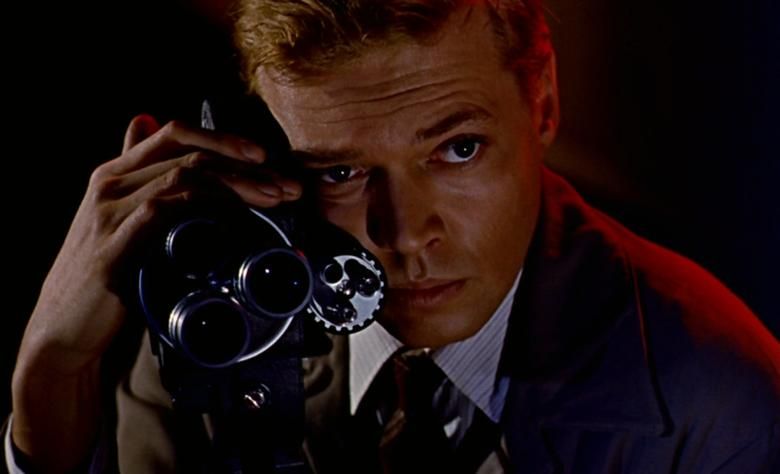
"Imagine . . . someone coming towards you . . . who wants to kill you . . . regardless of the consequences."
"A madman?"
"Yes. But he knows it -- and you don't. And just to kill you . . . isn't enough for him."
The year is 1960. Janet Leigh takes a shower at the Bates Motel when a knife-wielding silhouette appears on the other side of the shower curtain. You already know what happens next, of course, because it's one of the most iconic scenes in movie history. Hailed by many as the greatest horror film of all-time and often cited as the genesis of the slasher sub-genre, Psycho was an enormous success, popular fifty years ago, still popular today. Yet months before Norman Bates put on a wig and a dress, a very similar film named Peeping Tom was lambasted by critics. Unlike Hitchcock, who received a boon to his career, Michael Powell, the director of Peeping Tom, suffered career suicide. One critic, Derek Hill, said the film should be "thrown into a sewer." Another critic, Len Mosley, said the film "is more depressing and nauseating than the leper colonies of East Pakistan, the back streets of Bombay and the gutters of Calcutta." Over the years, Peeping Tom has been rediscovered, re-evaluated and reappraised. As a result, its critical reputation has soared, yet it still stands in the shadow of Hitchcock's beloved classic. That's unfortunate, since Peeping Tom is just as revolutionary, just as magnificent, and, in some ways, even superior to Psycho.
At first glance it might be easy to confuse Mark Lewis, the "psycho" of Peeping Tom, with household name Norman Bates. They're both shy, soft spoken, uncomfortable in social situations, awkward around the opposite sex. They share voyeuristic urges and a penchant for murder. They're both victims of bad parenting. Hell, they even share a fondness for milk. But through Mark's budding relationship with Helen, the meek, redheaded young woman who rents the apartment beneath his own, we see a tender, boyish, loving side to his character that paints him in a more sympathetic light than Norman Bates. Mark is damaged, but he's human: part murderer, part victim. Unlike Norman, Mark is aware of his mental illness and expresses a desire to cure himself. Despite his horrible crimes, I found myself rooting for his well-being. When he tries to secretly film the murder investigation of one of his victims and accidentally alerts authorities to his presence, I held my breath not just because of the tension of the scene, but because I wanted him to evade capture long enough to conquer his demons. My heart broke for him during his tender moments with Helen. I felt his sorrow, his pain, his desperation. It's a testament to Carl Boehm's phenomenal performance that Mark maintains such vulnerability despite his sinister deeds.
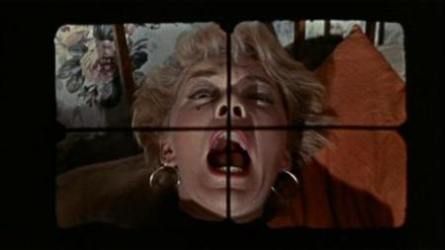
The root of Norman Bates's psychological problems were a result of his unhealthy relationship with his mother. For Mark Lewis, daddy is to blame. "I've never known a moment's privacy," he tells Helen, since his father, a biologist obsessed with fear and the nervous system, filmed and documented every moment of Mark's life. Unlike Psycho, which relied on clumsy dialogue to diagnose and deliver Bates's back story, Peeping Tom uses a much more effective method: Mark, at Helen's insistence, rolls footage from his youth that shows his dad waking him in the middle of the night, purposely frightening him, throwing lizards on him, even filming Mark's last moments with his mother on her deathbed. Seeing firsthand that Mark was never treated as a son, but as a guinea pig -- his entire childhood nothing but an experiment to his father -- injects an enormous amount of sympathy into his character. Suddenly everything makes sense: Helen's attraction and protectiveness toward Mark, since she pities his past and thinks she understands the cause of his anti-social behavior; the camera's manipulative power over Mark, since the footage from his youth reveals that the camera was a gift from his late father; and Mark's obsession with capturing fear in its ultimate form, since he is continuing his father's research. When you take into consideration that Michael Powell himself played the role of Mark's father, and that Powell's own son played the role of young Mark, effectively blending reality and cinema, it adds another eerie layer to the proceedings.
My favorite sequence of Peeping Tom occurs on a movie set. Mark is an aspiring filmmaker and one of his jobs is on a movie crew. After a day's worth of filming, he arranges to meet Vivian, the lead actresses's stand-in, after hours to make a film of their own. Since Mark had an opportunity to kill Helen the night before in his personal cinema but resisted the urge, it's easy to question if Vivian, with her bright red hair, isn't also a stand-in for his neighbor and soon-to-be love interest. Leading up to the scene, Michael Powell establishes an ominous, foreboding tone using items typical of a movie set-- props, fake backdrops, lighting equipment, etc-- as weapons of dread. Then Mark appears, camera in tow, descending from the rafters like the director of the picture, ready to capture Vivian's final performance. It's fascinating and frightening to watch the change in his demeanor. Instead of resembling the shy, awkward, insecure Mark of previous scenes, he is transformed into a smooth, assuredly calm, confident predator, his eyes exhibiting hunger and lust as he directs his prey in what he hopes will be the climax for his documentary on fear.
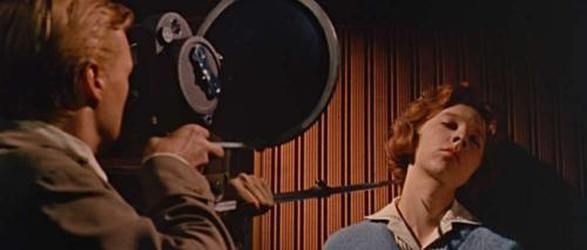
In the aforementioned scene, as I watched Moria Shearer's character dance happily around the movie set to a musical number (invoking memories of an earlier Powell-Shearer collaboration, 1948's The Red Shoes, a phenomenal film in its own right), I thought of classic-era Hollywood and its happy endings and its virtuous ideals, and I watched Mark -- or Michael Powell, rather -- impale those virtues through the neck. No wonder critics found Peeping Tom vile and disgusting, since the film revels in perversity, focusing on sordid topics like pornography and prostitution and repressed sexuality. There's a seediness to nearly every scene, as if every line of dialogue is a naughty secret, every performance naked and exposed. Peeping Tom exists behind closed doors; it operates at night, when the well-to-do citizens are asleep and the sinners slink. The lurid tone adds to the feeling of unease. Peeping Tom also introduces many ingredients that would become staples of the slasher sub-genre. For example, we watch Mark stalk a prostitute in the streets, the first of several victims who are sexually promiscuous women, whereas Helen -- the "virgin," so to speak -- provides an early prototype for The Final Girl.
Peeping Tom is tame compared to the slashers that have followed in the decades since its debut. With the exception of the climactic final scene, no deaths are shown on screen. The blood spills only in your imagination, yet the power of suggestion is so strong that you'll cringe and shield your eyes even when the violence isn't visible. Typical slashers feature a masked killer systematically offing teenagers one by one. As a viewer, you're expected to be entertained by the deaths on screen. In Peeping Tom, Mark's weapon of choice isn't a knife or a machete, but a camera, and therein lies the brilliance of the film. He kills his victims with the tripod of his camera as they stare back at a reflection of their frightened selves. Later, when Mark watches the footage from the darkness of his private cinema, we partake in the ritual with him as we watch the same footage from over his shoulder. The title of the film doesn't just refer to Mark, but to viewers. We are the peeping toms. We are the voyeurs. The true killer is the camera, and we are implicated in its crimes. Not only does Peeping Tom lay the groundwork for future slashers, it deconstructs the entire genre while simultaneously giving birth to it. Mark is essentially a mirror of ourselves, watching death for gratification, so who is more disturbed: us or him?
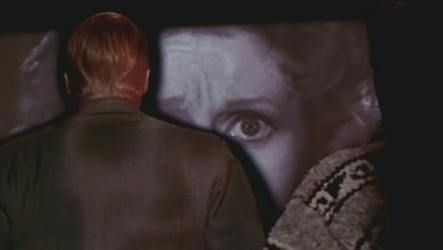
As previously stated, Carl Boehm is phenomenal in the role of Mark Lewis. Throughout the film you witness the internal struggle of his character as he fights against his murderous impulses, one moment caressing the camera like an innocent child, the next moment using the same camera in an act of unflinching cruelty. He is perhaps the most sympathetic serial killer I've seen in a film, but his level of sympathy and authenticity only makes him all the more frightening. Anna Massey is also very good as Helen, and so is Maxine Audley as Helen's blind mother. Moira Shearer has little screen time, but her beauty and grace are on full display during the film's highlight moment. Anna Massey nails a scene late in the film when the camera (Powell's, not Mark's) is trained solely on her face as she runs a gamut of emotions: curiosity, amusement, concern, shock, terror. The ending is both harrowing and tragic (and given what happened to Powell after making this film, strangely poetic). The script by Leo Marks is brilliant and filled with superb dialogue and psychological complexity. The sound mixing, whether it's the pounding of a heartbeat or the steady hum from a reel of film, is notably excellent. And then there's Michael Powell, the ostracized director, who maximizes the tension, the suspense, the thrills, the frights, the emotion and everything else in the film with his masterful direction and extraordinary talent.
Psycho is one of my top-ten favorite movies of all-time, so when I say that Peeping Tom is just as good, well, that's mighty high praise. Personally, I find Bates more frightening, more disturbing and more chilling, but my feelings toward Mark are more complicated, since I felt a great level of sympathy for his character and even rooted for him while at the same time rooting against his actions. If anything, Mark Lewis is the better character while Norman Bates is the better villain. Of the two films, Psycho is scarier and more suspenseful, but Peeping Tom digs a little deeper, hits a little harder, and I feel like it's the richer, more multi-layered of the two films. No doubt about it, however, both Psycho and Peeping Tom are phenomenal films, and in a genre that's often disrespected and littered with waste, they stand side-by-side on the mountaintop as proof that horror movies-- yes, even slashers -- can reach the same level of technical brilliance and artistic genius as any other film.
Peeping Tom, welcome to my favorites.
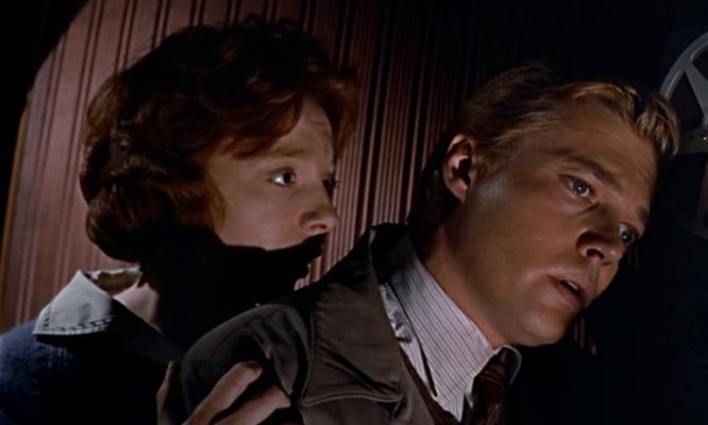
(Michael Powell, 1960)
(Starring: Carl Boehm; Anna Massey; Moira Shearer; Maxine Audley)

"Imagine . . . someone coming towards you . . . who wants to kill you . . . regardless of the consequences."
"A madman?"
"Yes. But he knows it -- and you don't. And just to kill you . . . isn't enough for him."
The year is 1960. Janet Leigh takes a shower at the Bates Motel when a knife-wielding silhouette appears on the other side of the shower curtain. You already know what happens next, of course, because it's one of the most iconic scenes in movie history. Hailed by many as the greatest horror film of all-time and often cited as the genesis of the slasher sub-genre, Psycho was an enormous success, popular fifty years ago, still popular today. Yet months before Norman Bates put on a wig and a dress, a very similar film named Peeping Tom was lambasted by critics. Unlike Hitchcock, who received a boon to his career, Michael Powell, the director of Peeping Tom, suffered career suicide. One critic, Derek Hill, said the film should be "thrown into a sewer." Another critic, Len Mosley, said the film "is more depressing and nauseating than the leper colonies of East Pakistan, the back streets of Bombay and the gutters of Calcutta." Over the years, Peeping Tom has been rediscovered, re-evaluated and reappraised. As a result, its critical reputation has soared, yet it still stands in the shadow of Hitchcock's beloved classic. That's unfortunate, since Peeping Tom is just as revolutionary, just as magnificent, and, in some ways, even superior to Psycho.
At first glance it might be easy to confuse Mark Lewis, the "psycho" of Peeping Tom, with household name Norman Bates. They're both shy, soft spoken, uncomfortable in social situations, awkward around the opposite sex. They share voyeuristic urges and a penchant for murder. They're both victims of bad parenting. Hell, they even share a fondness for milk. But through Mark's budding relationship with Helen, the meek, redheaded young woman who rents the apartment beneath his own, we see a tender, boyish, loving side to his character that paints him in a more sympathetic light than Norman Bates. Mark is damaged, but he's human: part murderer, part victim. Unlike Norman, Mark is aware of his mental illness and expresses a desire to cure himself. Despite his horrible crimes, I found myself rooting for his well-being. When he tries to secretly film the murder investigation of one of his victims and accidentally alerts authorities to his presence, I held my breath not just because of the tension of the scene, but because I wanted him to evade capture long enough to conquer his demons. My heart broke for him during his tender moments with Helen. I felt his sorrow, his pain, his desperation. It's a testament to Carl Boehm's phenomenal performance that Mark maintains such vulnerability despite his sinister deeds.

The root of Norman Bates's psychological problems were a result of his unhealthy relationship with his mother. For Mark Lewis, daddy is to blame. "I've never known a moment's privacy," he tells Helen, since his father, a biologist obsessed with fear and the nervous system, filmed and documented every moment of Mark's life. Unlike Psycho, which relied on clumsy dialogue to diagnose and deliver Bates's back story, Peeping Tom uses a much more effective method: Mark, at Helen's insistence, rolls footage from his youth that shows his dad waking him in the middle of the night, purposely frightening him, throwing lizards on him, even filming Mark's last moments with his mother on her deathbed. Seeing firsthand that Mark was never treated as a son, but as a guinea pig -- his entire childhood nothing but an experiment to his father -- injects an enormous amount of sympathy into his character. Suddenly everything makes sense: Helen's attraction and protectiveness toward Mark, since she pities his past and thinks she understands the cause of his anti-social behavior; the camera's manipulative power over Mark, since the footage from his youth reveals that the camera was a gift from his late father; and Mark's obsession with capturing fear in its ultimate form, since he is continuing his father's research. When you take into consideration that Michael Powell himself played the role of Mark's father, and that Powell's own son played the role of young Mark, effectively blending reality and cinema, it adds another eerie layer to the proceedings.
My favorite sequence of Peeping Tom occurs on a movie set. Mark is an aspiring filmmaker and one of his jobs is on a movie crew. After a day's worth of filming, he arranges to meet Vivian, the lead actresses's stand-in, after hours to make a film of their own. Since Mark had an opportunity to kill Helen the night before in his personal cinema but resisted the urge, it's easy to question if Vivian, with her bright red hair, isn't also a stand-in for his neighbor and soon-to-be love interest. Leading up to the scene, Michael Powell establishes an ominous, foreboding tone using items typical of a movie set-- props, fake backdrops, lighting equipment, etc-- as weapons of dread. Then Mark appears, camera in tow, descending from the rafters like the director of the picture, ready to capture Vivian's final performance. It's fascinating and frightening to watch the change in his demeanor. Instead of resembling the shy, awkward, insecure Mark of previous scenes, he is transformed into a smooth, assuredly calm, confident predator, his eyes exhibiting hunger and lust as he directs his prey in what he hopes will be the climax for his documentary on fear.

In the aforementioned scene, as I watched Moria Shearer's character dance happily around the movie set to a musical number (invoking memories of an earlier Powell-Shearer collaboration, 1948's The Red Shoes, a phenomenal film in its own right), I thought of classic-era Hollywood and its happy endings and its virtuous ideals, and I watched Mark -- or Michael Powell, rather -- impale those virtues through the neck. No wonder critics found Peeping Tom vile and disgusting, since the film revels in perversity, focusing on sordid topics like pornography and prostitution and repressed sexuality. There's a seediness to nearly every scene, as if every line of dialogue is a naughty secret, every performance naked and exposed. Peeping Tom exists behind closed doors; it operates at night, when the well-to-do citizens are asleep and the sinners slink. The lurid tone adds to the feeling of unease. Peeping Tom also introduces many ingredients that would become staples of the slasher sub-genre. For example, we watch Mark stalk a prostitute in the streets, the first of several victims who are sexually promiscuous women, whereas Helen -- the "virgin," so to speak -- provides an early prototype for The Final Girl.
Peeping Tom is tame compared to the slashers that have followed in the decades since its debut. With the exception of the climactic final scene, no deaths are shown on screen. The blood spills only in your imagination, yet the power of suggestion is so strong that you'll cringe and shield your eyes even when the violence isn't visible. Typical slashers feature a masked killer systematically offing teenagers one by one. As a viewer, you're expected to be entertained by the deaths on screen. In Peeping Tom, Mark's weapon of choice isn't a knife or a machete, but a camera, and therein lies the brilliance of the film. He kills his victims with the tripod of his camera as they stare back at a reflection of their frightened selves. Later, when Mark watches the footage from the darkness of his private cinema, we partake in the ritual with him as we watch the same footage from over his shoulder. The title of the film doesn't just refer to Mark, but to viewers. We are the peeping toms. We are the voyeurs. The true killer is the camera, and we are implicated in its crimes. Not only does Peeping Tom lay the groundwork for future slashers, it deconstructs the entire genre while simultaneously giving birth to it. Mark is essentially a mirror of ourselves, watching death for gratification, so who is more disturbed: us or him?

As previously stated, Carl Boehm is phenomenal in the role of Mark Lewis. Throughout the film you witness the internal struggle of his character as he fights against his murderous impulses, one moment caressing the camera like an innocent child, the next moment using the same camera in an act of unflinching cruelty. He is perhaps the most sympathetic serial killer I've seen in a film, but his level of sympathy and authenticity only makes him all the more frightening. Anna Massey is also very good as Helen, and so is Maxine Audley as Helen's blind mother. Moira Shearer has little screen time, but her beauty and grace are on full display during the film's highlight moment. Anna Massey nails a scene late in the film when the camera (Powell's, not Mark's) is trained solely on her face as she runs a gamut of emotions: curiosity, amusement, concern, shock, terror. The ending is both harrowing and tragic (and given what happened to Powell after making this film, strangely poetic). The script by Leo Marks is brilliant and filled with superb dialogue and psychological complexity. The sound mixing, whether it's the pounding of a heartbeat or the steady hum from a reel of film, is notably excellent. And then there's Michael Powell, the ostracized director, who maximizes the tension, the suspense, the thrills, the frights, the emotion and everything else in the film with his masterful direction and extraordinary talent.
Psycho is one of my top-ten favorite movies of all-time, so when I say that Peeping Tom is just as good, well, that's mighty high praise. Personally, I find Bates more frightening, more disturbing and more chilling, but my feelings toward Mark are more complicated, since I felt a great level of sympathy for his character and even rooted for him while at the same time rooting against his actions. If anything, Mark Lewis is the better character while Norman Bates is the better villain. Of the two films, Psycho is scarier and more suspenseful, but Peeping Tom digs a little deeper, hits a little harder, and I feel like it's the richer, more multi-layered of the two films. No doubt about it, however, both Psycho and Peeping Tom are phenomenal films, and in a genre that's often disrespected and littered with waste, they stand side-by-side on the mountaintop as proof that horror movies-- yes, even slashers -- can reach the same level of technical brilliance and artistic genius as any other film.
Peeping Tom, welcome to my favorites.

